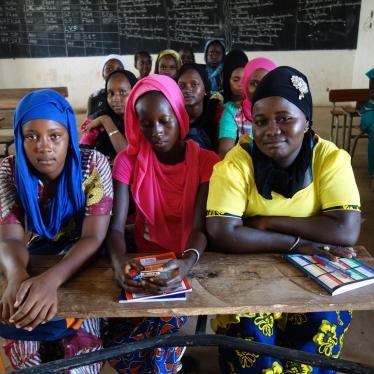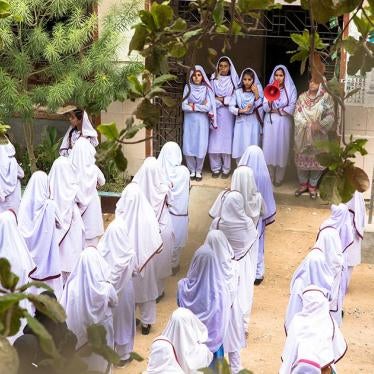Human Rights Watch has come under fire recently, accused of bias, an excessive focus on one country, lacking credibility and impartiality and even promoting terrorism.
"HRW [has] no credibility," says a cabinet minister. "Human Rights Watch is at our throat again," complains a newspaper editorial, "singling out" the country. A ruling party spokesman says a report on Gaza lacks "objectivity and impartiality." A government Web site claims Human Rights Watch is adopting "a Goebbelsian approach" and "repeat[s] lies about the country, its government and people as often and as long as possible to make the world believe it is the truth."
Those complaints might sound familiar to anyone who's followed the Netanyahu government's campaign to discredit Human Rights Watch (and anyone else who reports on Israeli abuses.) The Prime Minister's Office has questioned HRW's methods and motives, falsely accused it of taking Saudi government funding and even of working on behalf of Hamas.
But the quotes above come from very different sources: Syria, Gulf News of the United Arab Emirates, Hamas and Sri Lanka.
It's unusual for governments to welcome HRW's reporting on their human rights violations, although many conscientious officials modify laws and behavior once abuses have been publicized. And it's easy to dismiss the knee-jerk reaction of governments when they try to shoot (or smear) the messenger.
But HRW also grapples with fair-minded critiques. Many ask, how we can rely on witness testimony when two sides are locked in combat - how we can believe accounts of abuses committed by the enemy? And how will we learn of abuses by their own side? The answer is by taking the interviewing process very seriously, conducting multiple, lengthy interviews in private, collecting details to corroborate or dismiss the statements and weighing all evidence, whether it supports or undermines that testimony.
HRW makes a point of seeking out as many viewpoints as possible - including that of military forces, government officials and alleged perpetrators.
Sometimes they refuse to meet with us - as is the position taken by the Netanyahu government. We have met the IDF in the past to seek information, explain our findings and discuss recommendations. But since Operation Cast Lead we have had no response to our questions, despite repeated requests for information or meetings, just dismissal of our reports as biased or misinformed, complaints that we do not reflect the government's point of view and pleas that we trust Israeli officials to investigate themselves.
But those investigations have yet to determine why so many Palestinian civilians were killed in Operation Cast Lead. It is understandable that many Israel supporters would rather believe the Netanyahu government: Threatened by Hamas (and Israel's other enemies), they rely on the government for protection. Yet ignoring IDF abuses doesn't make them disappear or make Israel any safer. Human rights abuses fan resentment and resistance, perpetuating violence.
The diversionary arguments aren't novel, such as the claim that HRW shouldn't investigate Israel's behavior because others are worse or because Israel is a democratic society. The Gulf News thinks HRW should lay off the UAE because it is an "open society," as if abuses by open societies are unknown - a logic by which we should also have ignored the Bush administration's torture and detention without trial.
The Syrian minister quoted above argued that "American organizations, including HRW, have no credibility. Let them go check the violations undertaken by the previous administration from Guantanamo... the violations of human rights in Gaza before they talk about other countries."
Similarly, some critics of HRW accuse us of ignoring abuses by Hamas and Hizbullah, or by undemocratic Arab regimes, to focus unfairly on Israel -allegations that would be refuted by a look at our Web site, with its extensive reporting on everything from US torture to Palestinian suicide bombings, rocket attacks on Israel and repression across the Middle East.
Sri Lankan officials say raising the alarm about the internment of 280,000 civilians shows HRW's "persistent desire to attack Sri Lanka to achieve the goals [of] the LTTE (Liberation Tigers of Tamil Eelam)" - as if working to stop abuses by one side means supporting the other side. A Hamas spokesman dismissed HRW's report on Kassam rockets for "lacking objectivity and impartiality" and putting "the executioner and the victim on the same footing," as if the side that sees itself victimized (which almost everyone does) need not respect human rights. And HRW is pro-Zionist to some critics, such as Iran, in part because it does not pronounce on the Palestinians "right of resistance" to a militarily superior power, even though we never pronounce on the legitimacy of going to war.
HRW makes an honest attempt to address the most serious human rights violations by each side to a conflict, in as objective a manner as possible, and that often means delivering uncomfortable news. The easy response is to demonize the messenger, as has happened to our work on China, Colombia, Ethiopia, Eritrea, Hizbullah, Morocco, Russia, Rwanda, Saudi Arabia, Vietnam, Venezuela and Zimbabwe. Is that really the company Israel wants to keep?





